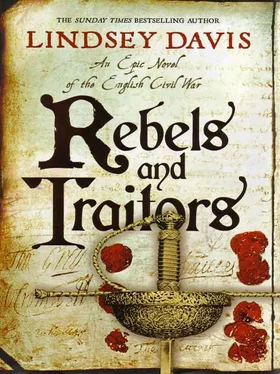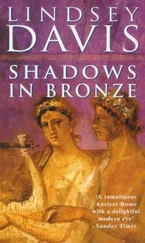Lindsey Davis - Rebels and traitors
Здесь есть возможность читать онлайн «Lindsey Davis - Rebels and traitors» весь текст электронной книги совершенно бесплатно (целиком полную версию без сокращений). В некоторых случаях можно слушать аудио, скачать через торрент в формате fb2 и присутствует краткое содержание. Жанр: Исторические приключения, на английском языке. Описание произведения, (предисловие) а так же отзывы посетителей доступны на портале библиотеки ЛибКат.
- Название:Rebels and traitors
- Автор:
- Жанр:
- Год:неизвестен
- ISBN:нет данных
- Рейтинг книги:4 / 5. Голосов: 1
-
Избранное:Добавить в избранное
- Отзывы:
-
Ваша оценка:
- 80
- 1
- 2
- 3
- 4
- 5
Rebels and traitors: краткое содержание, описание и аннотация
Предлагаем к чтению аннотацию, описание, краткое содержание или предисловие (зависит от того, что написал сам автор книги «Rebels and traitors»). Если вы не нашли необходимую информацию о книге — напишите в комментариях, мы постараемся отыскать её.
Rebels and traitors — читать онлайн бесплатно полную книгу (весь текст) целиком
Ниже представлен текст книги, разбитый по страницам. Система сохранения места последней прочитанной страницы, позволяет с удобством читать онлайн бесплатно книгу «Rebels and traitors», без необходимости каждый раз заново искать на чём Вы остановились. Поставьте закладку, и сможете в любой момент перейти на страницу, на которой закончили чтение.
Интервал:
Закладка:
'Oh I'll tell her — but I give nowt for your chances, Captain,' answered Nat Tew in his lugubrious sing-song accent, enjoying the hopelessness. It made Gideon hunch his shoulders and move on. London landlords were bad enough; northerners, with their world-weary pessimism, made him truly depressed.
King Street had inns from end to end. These were all dark, unwelcoming holes, full of unhelpful, untrustworthy, dangerous-looking people, none of whom wanted to have anything to do with the government. At least Gideon knew they would have been the same, whatever government held power. They had all heard about Sindercombe's firework — the one placed in the palace chapel. A few even made vague claims, which rapidly collapsed under scrutiny, that they knew a man who knew someone else who had seen the device sitting on a tavern table… Nobody had ever heard of a second firework — or so they said.
In June, Thurloe received information that Sexby might be making one of his secret trips back to England.
There was no mention of Lovell. However, according to intelligence, Charles Stuart was sending his own would-be assassins. Gideon believed Lovell would be among them, perhaps the leading one. Everything he had learned about the man suggested he was too restless to hang around some hostile European town in a rundown regiment of the King's or Duke of York's, waiting to take part in a hypothetical invasion that might never happen. Lovell would be up to mischief. Lovell would return to England.
Lovell was indeed back. After the failure of the firework plot, he had fled to the Continent, taking Thomas. It was now almost a year since Tom had joined his father. He had had his thirteenth birthday, in November, and it was not lost on him that his father had been quite unaware of this anniversary. Tom knew his mother would have been thinking of him. In his heart, he knew she thought about him every day. Being thirteen had made Tom wonder what his life would be. As Royalist exiles, he and his father were living on their uppers, with no real social place and no prospects. Tom loathed being in a foreign country, unable to speak the language, uncertain of his way around, frightened he might never see his home again. Other sons of cavaliers were sent back to England to live on their fathers' estates with their mothers; arrangements were made for these sons to have education and careers. Tom Lovell realised that no such life was planned for him. When he tried to talk to his father, Orlando merely said, 'We have to shift for ourselves, lad.' Tom mentioned cautiously how Lambert Jukes had once offered him an apprenticeship. His father's reaction was dramatic: 'Damme, I'd sooner have you dead in a ditch than a manufacturer of ships' biscuit!'
'Well, I never agreed to it,' Tom backed out hastily. 'Though Uncle Lambert did tell me, I could end up an alderman — or even Lord Mayor of London.'
Orlando Lovell became so distressed and annoyed, that although normally abstemious, he drank a whole bottle of Rhenish wine in half an hour before dinner, and then was ill after it.
He almost refused to bring Tom with him the next time he came back to England. But there was nowhere in unfriendly Flanders where a penniless English boy could be safely left. It was cheaper, and more secure, to bring Tom back. Travelling as a pair also made them less conspicuous.
Thomas seemed compliant. He never asked to return to his mother, never now even wanted to write to her. So father and son slipped ashore at Dover, which Royalists rightly believed was a slack port where unlawful immigrants could easily land. They made their way to London. After several moves to confuse observers, Lovell took them to an inn where they had stayed once before, the Swan in King Street. They had now slipped back into their old skulking life, looking anonymous and unremarkable.
But Thomas had his own ideas about that.
One evening, half an hour's walk away in Bread Street, Anne Jukes happened to glance out of a small window that overlooked the private yard at the back of her house. Lambert had recently completed his father's long-ago-planned house-of-easement, in memory of John. It was also to please his wife who, ever since the Ranting incident, believed it her right to exact work around the house at frequent intervals.
Glancing through the pane, Anne suppressed a startled squeak. She saw a boy she recognised, carrying a small bundle, slip into the house-of-easement. He did not come out.
Ten minutes later Anne walked quietly across the yard. She pulled open the door and remarked into the gloom, 'I made one of my walnut cakes this afternoon. I can bring you some out here — but you have no need to crouch in the dark. There is Gideon's old room in the house, just waiting to be occupied by somebody who needs a refuge, Thomas.'
Chapter Eighty- Four — The Tower of London: July 1657
The ceremonies for the Protector were held without incident. On July the 24th, a warrant was issued for the arrest of Edward Sexby. That same day, a man was plucked off a ship just as it was about to sail for Flanders. He was arrested and taken rapidly back to London. He looked like a countryman, in shabby clothes and with a rough beard; born in Suffolk, he managed a creditable country accent. But customs officers had seen through the disguise.
He was brought to the Tower. The welcoming party regarded him curiously. Following so many doomed world-movers and crown-chasers into that great fortress, was enough to make any heart quake. He showed no reaction as he was dwarfed by the stronghold, a city in itself, with its intimidating curtain walls, numerous towers — some so massive they had towers of their own — silent cannon, working portcullises, ancient chapels where implacable monarchs and governments had laid to rest queens, traitors, pretenders and misfits who offended them. He would know there were torture chambers. Deep in the bowels, out of earshot, was ferocious equipment, developed over centuries, in the keeping of heartless operators who enjoyed their work.
A tall, fair- haired man had been hurriedly sent by Thurloe. He identified the prisoner: 'Yes, this is Sexby'
Sexby bore no malice. His self-confidence, always only a little short of arrogance, made him proud to be recognised. They were using the Beauchamp and Broad Arrow Towers for political prisoners these days, though there was plenty of choice. Sexby was taken to a cell, a grim lodging but at least it was a room, not a dungeon. Taking a chance, Gideon asked to be allowed time with him.
'Yes, settle him in — good notion. Soften him up..' No chance of that, not with Sexby.
It was nine' years since Holdenby, eight from the Putney Debates. Gideon found Sexby older, more worn, yet more direct; probably he himself was the same. As a prisoner, Sexby looked tired, withdrawn, accepting. He made no excited protestations of innocence: all classic signs of guilt. Briefly questioned on arrival, he had given very little away. He would be like Sindercombe, never admitting anything. He would positively enjoy holding out. But Gideon did not believe Sexby would kill himself; he would force Cromwell to execute him, intending that Cromwell would look more tyrannical.
The two men stared around the bare, dark cell, with its barred windows, cold stone walls, empty fireplace. There was a narrow bed and an uneven little table. Through the thick stone walls crept sickness, damp, bedbugs and despair. There was a high risk of death.
'I would offer to bring in necessities, but…' Gideon was thinking of Sindercombe and the poison. Daring escapes had happened over the Tower's long history, but Colonel Barkstead was meticulous. He had caught one Royalist soaking his window bars with aqua fortis. He would not lose Sexby.
'Ink and paper?'
Gideon shook his head. 'Forbidden. I heard you are married — your wife and any other family will be allowed to visit.' Sexby gave a faint nod. Mrs Elizabeth Ford, the mistress who effected Sexby's escape from capture at Weymouth, now called herself Elizabeth Sexby; she had been with him in Flanders and had borne him children.
Читать дальшеИнтервал:
Закладка:
Похожие книги на «Rebels and traitors»
Представляем Вашему вниманию похожие книги на «Rebels and traitors» списком для выбора. Мы отобрали схожую по названию и смыслу литературу в надежде предоставить читателям больше вариантов отыскать новые, интересные, ещё непрочитанные произведения.
Обсуждение, отзывы о книге «Rebels and traitors» и просто собственные мнения читателей. Оставьте ваши комментарии, напишите, что Вы думаете о произведении, его смысле или главных героях. Укажите что конкретно понравилось, а что нет, и почему Вы так считаете.












